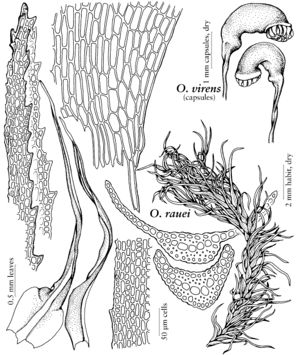Difference between revisions of "Oncophorus virens"
Bryol. Univ. 1: 399. 1826,.
FNA>Volume Importer |
imported>Volume Importer |
||
| Line 53: | Line 53: | ||
|publication year= | |publication year= | ||
|special status= | |special status= | ||
| − | |source xml=https:// | + | |source xml=https://bibilujan@bitbucket.org/aafc-mbb/fna-data-curation.git/src/bb6b7e3a7de7d3b7888a1ad48c7fd8f5c722d8d6/coarse_grained_fna_xml/V27/V27_604.xml |
|genus=Oncophorus | |genus=Oncophorus | ||
|species=Oncophorus virens | |species=Oncophorus virens | ||
Revision as of 22:34, 27 May 2020
Plants in loose tufts, green to yellow-brown. Stems 1–5(–8) cm. Leaves folded and sometimes crisped when dry, flexuose when moist, ovate-lanceolate, gradually narrowed from ovate base, sometimes coarsely serrated above, 2.5–5 mm, keeled distally, not sheathing at base, margins revolute from base to leaf middle; costa stout, mostly percurrent; laminal cells mostly 2-stratose; distal laminal cells mostly subquadrate; basal laminal cells elongate, shorter at the margins, rectangular, incrassate, alar cells enlarged and pellucid. Seta (7–)10–20(–22) mm. Capsule yellow-brown, slightly furrowed when dry, 1.5–2 mm. Spores 18–25 µm.
Phenology: Capsules mature late spring–early summer.
Habitat: Moist rocks, rotten logs or soil
Distribution
Greenland, Alta., B.C., Man., N.B., Nfld. and Labr. (Nfld.), N.W.T., N.S., Nunavut, Ont., Que., Sask., Yukon, Ala., Alaska, Ariz., Ark., Calif., Colo., Conn., Del., D.C., Fla., Ga., Idaho, Ill., Ind., Iowa, Kans., Ky., La., Md., Mass., Mich., Minn., Miss., Mo., Mont., Nebr., Nev., N.H., N.J., N.Mex., N.Y., N.C., N.Dak., Ohio, Okla., Oreg., Pa., R.I., S.C., S.Dak., Tenn., Tex., Utah, Vt., Va., Wash., W.Va., Wis., Wyo., Europe, Asia.
Discussion
A form of Oncophorus virens with coarsely toothed distal margins, was once treated as var. serratus and is often found on rocks in or near streams. The North American material examined (as noted also by A. J. Grout 1928–1940, vol. 2) varies considerably in the shape of the leaf base, the extent of the revolute leaf margins, and the presence or absence of alar cells in young plants.
Selected References
None.
